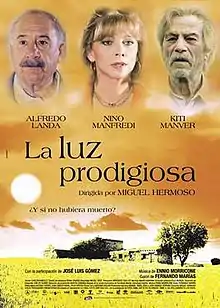The End of a Mystery
The End of a Mystery (Spanish: La luz prodigiosa) is a 2003 Spanish-Italian drama film directed by Miguel Hermoso. The screenplay was written by Fernando Marías, who adapted his own 1991 novel La luz prodigiosa.[1]
| The End of a Mystery | |
|---|---|
 Film poster | |
| Spanish | La luz prodigiosa |
| Directed by | Miguel Hermoso |
| Screenplay by | Fernando Marías |
| Based on | La luz prodigiosa by Fernando Marías |
| Starring | Alfredo Landa |
| Cinematography | Carlos Suárez |
| Music by | Ennio Morricone |
Production companies |
|
Release date |
|
Running time | 108 minutes |
| Countries |
|
| Language | Spanish |
Cast
- Alfredo Landa as Joaquín[2]
- Nino Manfredi as Galápago[2]
- Kiti Manver as Adela[2]
- José Luis Gómez as Silvio[2]
- Iván Corvacho Cervantes as the boy Joaquín
- Sergio Villanueva as the boy Galápago
- Mariano Peña
- Fanny de Castro as the Nun
- Fernando Picón as the Lawyer
- Miguel Alcíbar as the Falangist
Production
A Spanish/Italian co-production, the film was produced by Azalea PC, Canal Sur Televisión and Surf Films, and it had the participation of Vía Digital and FORTA.[2]
Release
The film was theatrically released on 31 January 2003.[2]
Accolades
| Year | Award | Category | Nominee(s) | Result | Ref. |
|---|---|---|---|---|---|
| 2003 | 25th Moscow International Film Festival | Golden St. George | Won | [3] | |
| 2004 | 18th Goya Awards | Best Adapted Screenplay | Fernando Marías | Nominated | [4] |
| Best Actor | Alfredo Landa | Nominated | |||
| Best Supporting Actor | José Luis Gómez | Nominated | |||
| Best Art Direction | Félix Murcia | Nominated | |||
References
- Citations
- "Fernando Marías: "Cuanto más oscuro es un personaje más fascinación sentimos por él"". Revista Casa Mediterráneo. 25 March 2019.
- Pelaz López & Tomasoni 2011.
- "25th Moscow International Film Festival (2003)". MIFF. Archived from the original on 3 April 2013. Retrieved 1 April 2013.
- "La luz prodigiosa". premiosgoya.com. Retrieved 6 February 2022.
- Bibliography
- Pelaz López, José-Vidal; Tomasoni, Matteo (2011). "Cine y guerra civil. El conflicto que no termina". Diacronie. Studi di Storia Contemporanea (7). doi:10.4000/diacronie.3337.
This article is issued from Wikipedia. The text is licensed under Creative Commons - Attribution - Sharealike. Additional terms may apply for the media files.